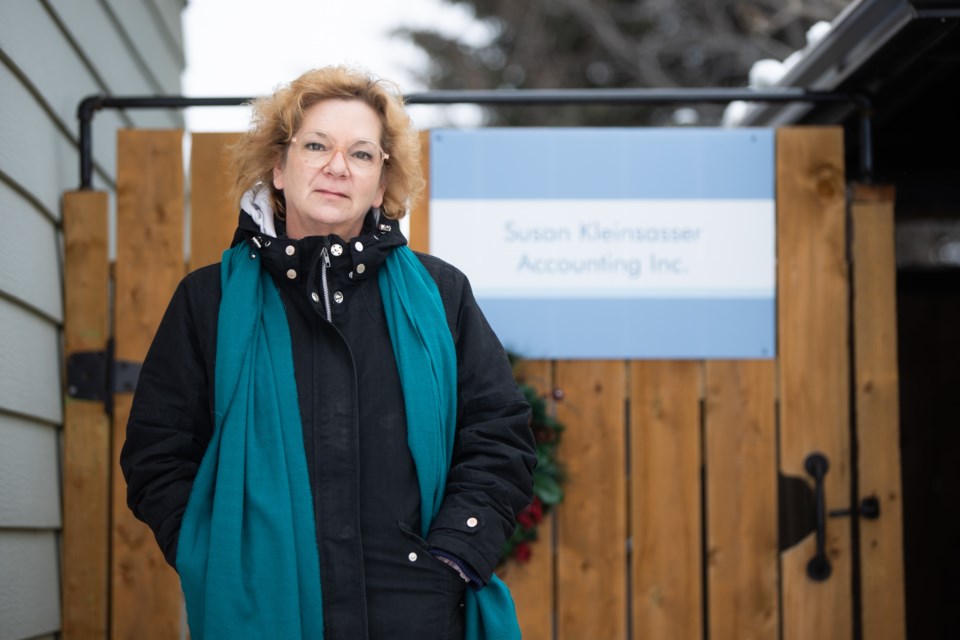Despite confirmation of additional funding in light of new COVID-19 regulations, some Okotoks small business owners are saying it misses the mark.
The Province announced an expansion of its Small and Medium Enterprise Relaunch Grant, announcing that businesses impacted by health orders could apply for a second payment through the program for 15 per cent of pre-pandemic monthly revenue up to a maximum of $15,000, for a total of $20,000 per business.
Business owners must have been forcibly shut down or be able to prove a 30 per cent revenue loss due to the restrictions to qualify.
Susan Kleinsasser, who operates Susan Kleinsasser Accounting Inc., said the new funding still leaves smaller businesses in the dark.
“I think they should have done more for the small, small business like the mom-and-pop shops – they’ve just fallen through the cracks,” said Kleinsasser. “And what about businesses that just started up this year? They don’t have anything to show for last year, so they won’t qualify for anything.”
Many smaller businesses haven’t been able to qualify for government programs due to their relatively small revenue or because they don’t carry enough non-deferrable expenses, she said.
The Canada Emergency Business Account (CEBA) program offers loans up to $60,000 but businesses must have $40,000 in non-deferrables, and for some small businesses – especially those working out of their homes or without employees, that’s a difficult hurdle to jump.
In some cases, like Kleinsasser's accounting firm, bad debt shows up as revenue on paper but has been written off, meaning although she’s not bringing in the money, she can’t qualify for programs like CEBA.
“I still show the revenue, but I didn’t get the cash,” said Kleinsasser. “I wasn’t about to go after people who are hurting to pay me. So I just wrote it off this year and then hopefully next year is a better year – but now I don’t qualify for any of the programs because on paper I did make that revenue.”
She said many accountants and bookkeepers she’s spoken with are in the same boat, with some writing off as much as $30,000 to help clients get through, but it leaves them in the lurch.
While she continues to lose clients because they’re being forced to shut their own doors, there isn’t much out there for people like Kleinsasser to get a little help through the pandemic.
“I don’t have access to funds to keep me going until things turn around, and that’s a concern to me,” she said. “I’m just not happy with the way these programs have come out and they seem to be ignoring the people who could really use it."
She said the Canada Emergency Response Benefit (CERB) payments offered to those who were suddenly unemployed due to COVID restrictions and closures did help many of her clients stay on their feet, but it’s coming at a cost as a taxable payment.
The new Canada Recovery Benefit (CRB) helps those who can’t qualify for Employment Insurance with $900, but recipients must reapply every two weeks should their situation not improve.
Kleinsasser said she’s encouraging many of her clients who are hairdressers or massager therapists to apply for the CRB payment on Monday when layoffs and closures come into effect, so long as they showed at least $5,000 on their 2019 tax return.
There are still a lot of questions around who qualifies for which programs, but Kleinsasser said with a light at the end of the pandemic tunnel she wishes smaller businesses had a little more help to reach the finish line.
“I know they had good intentions here – I’m not trying to bash the government, but they’re missing a step, they’re missing a vital step to small business,” she said. “If they would just expand the programs to small businesses that are mom-and-pop shops I think you would be able to see us stay open during this second wave and come back even stronger than ever on the other end.”
There is some help for businesses that don’t qualify for the government programs.
Community Futures in Alberta has received an additional $18.9 million for its Rural Relief and Recovery Fund (RRRF), which began with an injection of $27 million in the spring.
Sara Noyes, executive director of Community Futures Highwood, said the loans are geared towards businesses that do not qualify for CEBA or other programs.
“That is the whole point of those loans,” said Noyes. “They are rural funds that are meant for businesses that are otherwise falling through the cracks.”
The RRRF loan can be any amount up to $40,000 and it is 25 per cent forgivable if paid back in full by December 2022, she said.
It is open to any business that falls within the catchment area of a Community Futures branch, and owners can apply online to their local chapter.
“The nice thing about the RRRF loans is that you have to have been adversely affected by COVID, but you don’t have to meet a certain number,” said Noyes.
Businesses must also be able to prove they were viable prior to March 1, 2020.
To apply for the RRRF loan visit www.highwood.albertacf.com.
Krista Conrad, OkotoksToday.ca
Read more from OkotoksToday.ca



